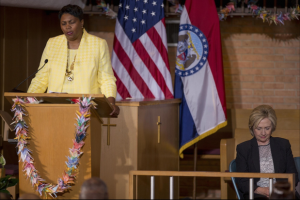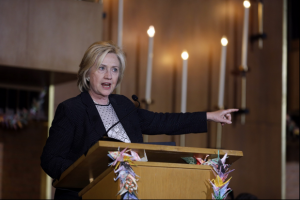The Washington Post 7/7/2015

One day in May, operatives from a Washington-based super PAC gathered New Hampshire mayors, state representatives and local politicos at Saint Anselm College for a day of training.
They rehearsed their personal tales of how they met Hillary Rodham Clinton and why they support her for president. They sharpened their defenses of her record as secretary of state. They scripted their arguments for why the Democratic front-runner has been “a lifetime champion of income opportunity.” And they polished their on-camera presentations in a series of mock interviews.
The objective of the sessions: to nurture a seemingly grass-roots echo chamber of Clinton supporters reading from the same script across the communities that dot New Hampshire, a critical state that holds the nation’s first presidential primary.
The super PAC, called Correct the Record, convened similar talking-point tutorials and media-training classes in May and June in three other early-voting states — Iowa, Nevada and South Carolina — as well as sessions earlier this spring in California.
Presidential campaigns have for decades fed talking points to surrogates who appear on national television or introduce candidates on the stump. But the effort to script and train local supporters is unusually ambitious and illustrates the extent to which the Clinton campaign and its web of sanctioned, allied super PACs are leaving nothing to chance.


When, say, a Londonderry Times reporter calls Rockingham County Democratic Committee members for a comment about the candidate, they are likely to parrot Correct the Record’s talking points about Clinton having been a fighter for the middle class — including improving rural health care as first lady of Arkansas to raising the minimum wage as a senator from New York.
[The making of Hillary 5.0: Marketing wizards re-imagine the Clinton brand]
“We are holding sessions with top communicators across the country where we talk about the best ways to discuss Secretary Clinton’s strong record of accomplishments, how to articulate Secretary Clinton’s positions most effectively and how to correct Republican operatives’ distortions of the facts,” said Adrienne Watson, communications director at Correct the Record.
But asking local supporters to use talking points could undermine the organic nature of grass-roots political interactions. No longer can a journalist call state representatives in Iowa and expect to hear their personal, candid takes on Clinton — nor can a Rotary Club member listen to fellow small-business owners talk about the candidate at the group’s monthly luncheon — without suspecting that they are reading from a script.
The super PAC’s effort comes as Clinton struggles on the campaign trail to appear accessible and genuine. Some Democrats have long thought that she sounds too scripted on the stump, especially compared with Sen. Bernie Sanders (I-Vt.), her insurgent primary rival whose authenticity and liberal message are drawing thousands of Democrats to his rallies.
New Hampshire state Sen. Lou D’Allesandro, a local elected official for decades and a longtime Clinton supporter, said he did not attend Correct the Record’s session, which was held May 18 at the New Hampshire Institute of Politics at Saint Anselm.
“I’ve known Hillary for a long time,” he said. “I’ve known her husband for a long time. She’s been at our home. I’ve visited her in Washington. I believe that I can articulate where she is on issues and I really don’t need anybody to tell me what to say. I believe that you stand for people because you believe what they stand for and you articulate it.”
 David Brock runs Correct the Record, a super PAC training Clinton supporters on talking points. (Danny Johnston/AP)
David Brock runs Correct the Record, a super PAC training Clinton supporters on talking points. (Danny Johnston/AP)Kathy Sullivan, a Democratic National Committee member from New Hampshire who attended the training, said it helped her “talk about the Hillary Clinton we know.” The session included a workshop in which supporters turned to the supporters sitting next to them and practiced sharing anecdotes about Clinton that help humanize her.
“We would each tell a personal story about Hillary Clinton that is an example of the qualities about her that make her attractive as a candidate. as opposed to listing a lot of policy positions,” Sullivan said.
[In Bernie Sanders, an unlikely — but real — threat to Hillary Clinton]
Correct the Record — one of several super PACs run by Clinton ally David Brock — coordinates some of its activities with Clinton’s campaign, but officials said the campaign played no role in the training sessions.
The Clinton team has its own surrogate operation that distributes talking points to supporters to ensure that its messages in local and national media are consistent.
For example, the campaign distributed an eight-page guide for volunteers with instructions for how to hold a house party. It encourages hosts to visit the campaign’s YouTube page to play videos of Clinton and tells them to invite guests “to share their story — everyone will get excited to talk about why they support Hillary,” according to the guide, which was made public Tuesday by the Sunlight Foundation.
The super PAC’s on-camera media training was conducted by the Franklin Forum and led by the group’s president, John Neffinger, a Democratic strategist who specializes in coaching people for television interviews.
Correct the Record held a series of similar media sessions in the spring of 2014 to prepare Clinton backers for interviews surrounding her national book tour for “Hard Choices,” a memoir of her State Department years.
Watson said the super PAC plans to hold additional training sessions later this year.
To supporters such as Eleni Kounalakis, who served as ambassador to Hungary in Clinton’s State Department, the program is welcome. In March, she and about 20 other supporters participated in a Correct the Record session in San Francisco. She said it helped refine the case she and others make for Clinton’s candidacy in public.
“Many people who are very vocal in supporting Secretary Clinton are very comfortable talking about why among their friends and in small groups — but when it comes to talking to the media, that can be very intimidating,” Kounalakis said. “Some people feel like, ‘I know Hillary has been there for the working person in her life, in her career, but I want someone to help me prepare those arguments so that I have that confidence to speak in a broader context.’ ”
Nick Sottile, 21, president of the College Democrats of South Carolina, said he felt “lucky” to attend a May 7 Correct the Record session in Columbia, S.C.
“It got right to the heart of things — how to cut through the noise and talk about Secretary Clinton’s record,” he said. “And not just what to say, but how to talk about her as a young person in South Carolina. It was good training in how to be an effective talker.”
http://www.washingtonpost.com/politics/the-making-of-a-hillary-clinton-echo-chamber/2015/07/07/01625c5e-24ae-11e5-b72c-2b7d516e1e0e_story.html?tid=sm_fb